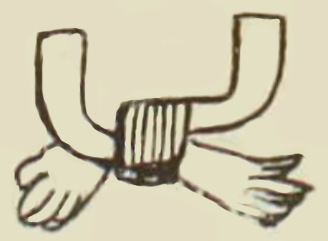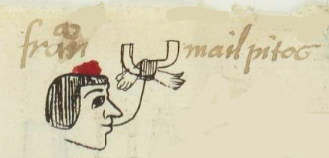Mailpitoc (MH895r)
This black-line drawing of the simplex glyph for the personal name Mailpitoc (perhaps “He Tied Someone’s Hands”) is attested here as a man’s name. The glyph shows a frontal view of two partial arms, bent at the elbows, and crossing at about the wrists. Where the wrists cross, the two arms are tied (expressing the verb, mailpia). The -toc suffix, which makes the verb purposive and past-tense, is not shown visually.
Stephanie Wood
This appears to be a form of punishment. Is this a European-influenced expression or was it a pre-contact practice? For instance, mailpia was used as part of an expression (see our Online Nahuatl Dictionary) about hobbling a horse. Similarly, there was an expression for tying the feet of a human or an animal, using icxi ilpia. The horse was reintroduced by Europeans; it has died out prior to contact.
Stephanie Wood
franco mailpitoc
Francisco Mailpitoc
Stephanie Wood
1560
Jeff Haskett-Wood
manos, atados, atar, nombres de hombres

mailpia, to tie someone’s hands or arms, https://nahuatl.wired-humanities.org/content/mailpia
ma(itl), hand or arm, https://nahuatl.wired-humanities.org/content/maitl
-toc (purposive action suffix, past tense), https://nahuatl.wired-humanities.org/content/toc
posiblemente, Le Ató las Manos a Alguien
Stephanie Wood
Matrícula de Huexotzinco, folio 895r, World Digital Library, https://www.loc.gov/resource/gdcwdl.wdl_15282/?sp=862&st=image.
This manuscript is hosted by the Library of Congress and the World Digital Library; used here with the Creative Commons, “Attribution-NonCommercial-ShareAlike 3.0 License” (CC-BY-NC-SAq 3.0).



